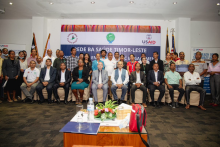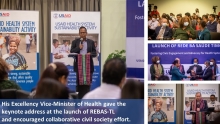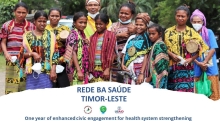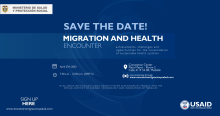Learning and knowledge sharing are fundamental to the LHSS Project. We invite you to search LHSS knowledge products and resources for the latest approaches, insights, and learning in the field of integrated health systems strengthening.

Civil society organizations in Timor-Leste are playing important roles to identify health system problems and solutions, contribute ideas to the Ministry of Health’s (MOH) annual action plan, and participate in monitoring that holds the government accountable.
This two-pager focuses on USAID’s Learning Question 1, “What are the contributions of systems thinking approaches and tools to changes in health system outcomes? How do systems thinking approaches affect health system outcomes?”
Returning funds to the Ministry of Finance at the end of the fiscal year is the last thing any Ministry of Health wants to do. In Peru, health budget officials are rolling out a strategy to stop that from happening.
An LHSS grantee in Colombia helps Venezuelan migrants understand how to obtain health services -- while gaining valuable knowledge and skills to strengthen its own organizational capacity.
LHSS conducted an assessment of the accuracy of drug scheduling tracking systems and developed recommendations to strengthen antiretroviral stockout and distribution monitoring.

Since its establishment in 2022, REBAS-TL has promoted civil society engagement with the country’s health sector to strengthen health outcomes for the Timorese people.

Rede Ba Saúde Timor-Leste (REBAS-TL), the country's first-ever health CSO network, celebrated its one-year anniversary on May 5, 2023 highlighting the network's achievements to date.
This document outlines recommendations for the design and implementation of the National Migrant Health Observatory. The recommendations seek to facilitate greater coordination and exchange of information among the public, international cooperation and civil society actors or stakeholders that articulate the response to Venezuelan migration in the country.
This document presents the Plan for the development of Organizational Capacities of the DPVIH of the Ministry of Health of Peru to improve the provision of health services against HIV to the Venezuelan migrant population in Peru
A Timorese NGO is helping the Ministry of Health provide accurate information about the COVID-19 vaccine, resulting in increased vaccination in target municipalities.
This Catalog allows practitioners to consider which interventions have more robust evidence bases to support their practical application, such as: enhancing worker and supervisor competencies through training, offering nonfinancial incentives for high performers, practicing task sharing to promote cost savings, implementing digital solutions to expand access to services, and reducing costs of procuring and distributing pharmaceutical products.
“As health care workers, we know our communities best and can help save lives when we have the best training and information.” — Gulsunmoh Abdulloeva

On April 27, 2023, local actors met to celebrate achievements, discuss challenges and opportunities, and highlight advances in sustainable integration of the Venezuelan migrant population, Colombian returnees, and host communities.
This two-pager focuses on USAID’s Learning Question 5, “What are effective and sustainable mechanisms or processes that enable the participation of private sector, civil society, and public organizations in developing locally-led solutions to improve high-performing health care, especially for poor and vulnerable populations? What enables the effective participation or leadership of marginalized populations themselves in the development and implementation of these solutions? Under what conditions is this participation different?”
This Year 4 Quarter 2 Report (Jan-Mar 2023) was prepared for USAID and provides a progress update for all annual work plan activities.
